
These lovely flowers are all from our garden and I have my wonderful mom-in-law to thank for this arrangement which I used for a very special interview this week with Dr. David Perlmutter (more on this below) for season 5 of The Anxiety Summit. I have my mom-in-law, Althea, to thank for all the flowers in all the interviews.
As you know, I love nature and flowers and because of this it feels really special to be able to say that The Anxiety Summit has been dubbed “a bouquet of hope.” Someone in one of the past seasons shared this anonymously and then sent me a lovely letter afterwards saying it was her.
Unfortunately, we were in the middle of packing to move and her letter was misplaced so I still don’t have a name and person to thank. If you’re reading this now, please please let me know it was you so I can thank you.
I’m sure you don’t need a study to convince you why you enjoy flowers so much but here goes anyway because – you know me – I love to geek out on the research.
In a study, Effect of olfactory stimulation by fresh rose flowers on autonomic nervous activity, 19 female university and graduate students (21 to 26 years old) reported an increase in physiological and psychological relaxation when smelling fresh roses. The study reported that the aroma of the fresh flowers led to
- a significant increase in parasympathetic nervous activities
- an increase in “comfortable” and “natural” feelings.
I’m not one bit surprised at these results! Are you? I would expect there to be an effect on our endorphins too because we feel so wonderful when we get a bunch of flowers from our loved one!
Dr. Perlmutter – Anxiety: Gut-Brain Communication & Diet
As I said above, I had the distinct pleasure of interviewing Dr. David Perlmutter for The Anxiety Summit this week (notice the flower arrangement in the background).

You likely know Dr. Perlmutter as the author of Grain Brain, The Surprising Truth About Wheat, Carbs and Sugar, with over 1 million copies in print. What a wonderful interview we had. He’s smart, articulate, funny, geeky and practical at the same time, and an all around lovely person. I can’t wait to share this and all the incredible interviews I have done for The Anxiety Summit 5: Gut-Brain Axis.
In my interview with Dr David Brady on this summit he mentions how Dr. Perlmutter has championed the whole gut-brain connection. We all appreciate him for this work and with him being a trailblazer and leader in this, having him as a speaker on this summit could not have been more perfect. This is our topic and the talking points we cover
Anxiety: Gut-Brain Communication & Diet
- Fermented foods, prebiotics, gut integrity and anxiety
- SCFAs/short chain fatty acids, HDACs and serotonin production
- Inflammation/cortisol and the amygdala/prefrontal cortex connection
Here is a snippet from our interview which went deep into the research, the mechanisms and biochemistry, and then brought it all back to practical interventions :
Both inflammation and stress can enhance anxiety. Well, what is anxiety? Anxiety is a physiological reaction to real of more commonly a perceived stress – in other words, a threat. There is no real threat there but the body perceives a situation that is not necessarily threatening as being threatening. So the body goes into this anxiety response for no good reason….
What we understand is that inflammation and cortisol actually tend to reduce the availability or the functionality of a connection between two parts of the brain. One of them, called the amygdala, is the fear center, and the other is the prefrontal cortex which is an area of the brain that tends to calm things down. It says to the amygdala: “Hey, cool, we’re glad you’re around but this isn’t one of those times you need to get excited.” It’s the adult in the room, if you will.
Inflammation and cortisol/stress breaks this key connection between the amygdala and the prefrontal cortex and these are one possible mechanism that leads to anxiety. We go on to discuss solutions such as diet, nature, and sleep.
I could have brought up flowers and talked more about nature at this point but we still had so much to cover.
Earlier in the interview went in depth into dietary aspects like delicious fermented foods and prebiotics such as garlic, onions, leeks and cauliflower. Prebiotics are fuel for short-chain fatty acids like butyrate, acetate and propionate, which are involved in the integrity of the gut lining, protect from intestinal inflammation. They are also involved in the manufacture of calming neurotransmitters, so here we have some of the stress/cortisol aspect covered.
Please join us and listen to the entire interview on The Anxiety Summit 5: Gut-Brain Axis.
Resources from Dr. Perlmutter
Now I get to share some of his wonderful work. You can find him online at DrPerlmutter.com and he has these new releases coming up:
- He is the editor of the upcoming collection The Microbiome and the Brain that will be authored by top experts in the field and will be published in 2019 by CRC Press – written for both practitioners and researchers. This is so exciting and perfectly supports what we cover in this summit.
- He shares a few gems from his book Brain Wash, which is proudly co-written with his son Austin Perlmutter, MD, in our interview.
Are you excited to hear my interview with Dr. Perlmutter? Which areas are of most interest to you?
And do you love flowers as much as I do? What are you favorites and how do you enjoy them?
If you have found any of the Anxiety Summits to be “a bouquet of hope” in your healing journey please tell us why and how you’re doing now.
If you’d like to give feedback or ask a question, please post in the comments below.